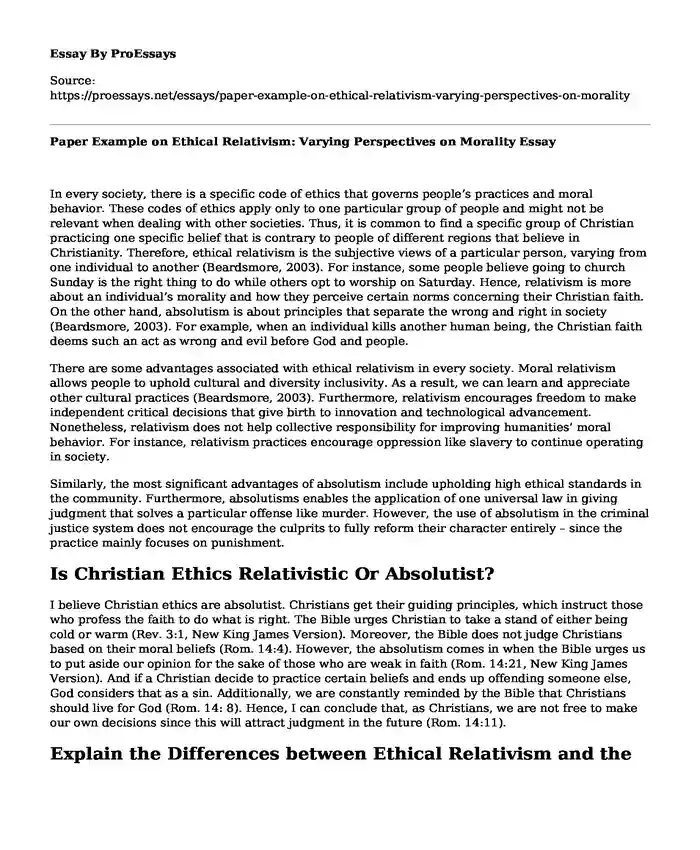In every society, there is a specific code of ethics that governs people’s practices and moral behavior. These codes of ethics apply only to one particular group of people and might not be relevant when dealing with other societies. Thus, it is common to find a specific group of Christian practicing one specific belief that is contrary to people of different regions that believe in Christianity. Therefore, ethical relativism is the subjective views of a particular person, varying from one individual to another (Beardsmore, 2003). For instance, some people believe going to church Sunday is the right thing to do while others opt to worship on Saturday. Hence, relativism is more about an individual’s morality and how they perceive certain norms concerning their Christian faith. On the other hand, absolutism is about principles that separate the wrong and right in society (Beardsmore, 2003). For example, when an individual kills another human being, the Christian faith deems such an act as wrong and evil before God and people.
There are some advantages associated with ethical relativism in every society. Moral relativism allows people to uphold cultural and diversity inclusivity. As a result, we can learn and appreciate other cultural practices (Beardsmore, 2003). Furthermore, relativism encourages freedom to make independent critical decisions that give birth to innovation and technological advancement. Nonetheless, relativism does not help collective responsibility for improving humanities’ moral behavior. For instance, relativism practices encourage oppression like slavery to continue operating in society.
Similarly, the most significant advantages of absolutism include upholding high ethical standards in the community. Furthermore, absolutisms enables the application of one universal law in giving judgment that solves a particular offense like murder. However, the use of absolutism in the criminal justice system does not encourage the culprits to fully reform their character entirely – since the practice mainly focuses on punishment.
Is Christian Ethics Relativistic Or Absolutist?
I believe Christian ethics are absolutist. Christians get their guiding principles, which instruct those who profess the faith to do what is right. The Bible urges Christian to take a stand of either being cold or warm (Rev. 3:1, New King James Version). Moreover, the Bible does not judge Christians based on their moral beliefs (Rom. 14:4). However, the absolutism comes in when the Bible urges us to put aside our opinion for the sake of those who are weak in faith (Rom. 14:21, New King James Version). And if a Christian decide to practice certain beliefs and ends up offending someone else, God considers that as a sin. Additionally, we are constantly reminded by the Bible that Christians should live for God (Rom. 14: 8). Hence, I can conclude that, as Christians, we are not free to make our own decisions since this will attract judgment in the future (Rom. 14:11).
Explain the Differences between Ethical Relativism and the Subjective Elements in Christian Ethics
Ethical relativism operates on the values of morality that applies to a specific society, whereas Christian ethics aligns with God’s command, which applies equally to all globally. Therefore, it is common to find Christian value clashing with relativism since not all the society’s morality is right (McQuilkin & Copan, 2014). For instance, some cultures give every individual freedom of expression hence encouraging things like gay practice. However, the Bible condemns such practices and considers them ungodly.
Conclusion
In conclusion, every individual, whether Christians or non-Christians, has their own set of relativistic beliefs. Therefore, society ought to come up with modalities that encourage good relativistic practices and incorporate them into Christian ethics to betterment humanity. All in all, we should all remember that the Word of God is faithful and ought to be our guiding light in this dark ages of evil.
References
Beardsmore, R. W. (2003). Moral reasoning. London: Routledge.
McQuilkin, J. R., & Copan, P. (2014). An introduction to biblical ethics: walking in the way of wisdom. Downers Grove, IL: IVP, an imprint of Intervarsity Press.
Cite this page
Paper Example on Ethical Relativism: Varying Perspectives on Morality. (2023, Sep 25). Retrieved from https://proessays.net/essays/paper-example-on-ethical-relativism-varying-perspectives-on-morality
If you are the original author of this essay and no longer wish to have it published on the ProEssays website, please click below to request its removal:
- The Trolley Problem and Fat Man Case Essay
- Annotated Bibliography: Kukai in Japanese Buddhism
- Essay Sample on Abraham the Chosen One
- Essay Sample on Buddhism And the Law of Karma
- Essay on Exploring Christianity in the Modern Age: Uncovering the Truth
- Research Paper on Achieve the American Dream: The Value of College Degrees
- Essay Sample on Human Growth: Cognitive, Biological & Psychosocial Processes







